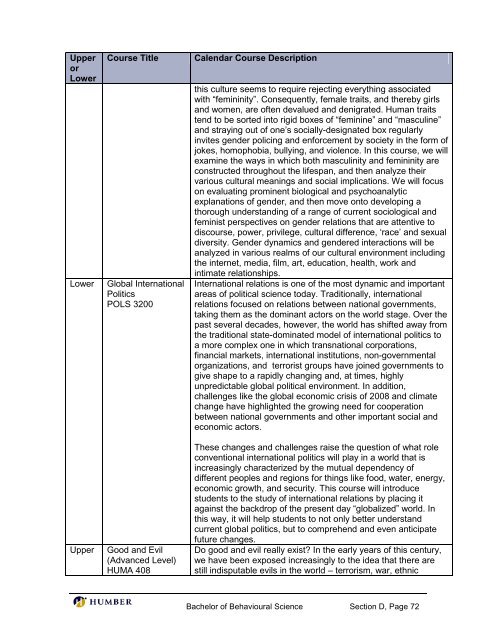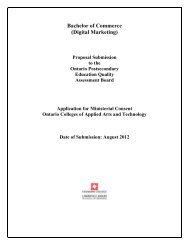Bachelor of Behavioural Science - Postsecondary Education Quality ...
Bachelor of Behavioural Science - Postsecondary Education Quality ...
Bachelor of Behavioural Science - Postsecondary Education Quality ...
Create successful ePaper yourself
Turn your PDF publications into a flip-book with our unique Google optimized e-Paper software.
Upper<br />
or<br />
Lower<br />
Lower<br />
Upper<br />
Course Title<br />
Global International<br />
Politics<br />
POLS 3200<br />
Good and Evil<br />
(Advanced Level)<br />
HUMA 408<br />
Calendar Course Description<br />
this culture seems to require rejecting everything associated<br />
with ―femininity‖. Consequently, female traits, and thereby girls<br />
and women, are <strong>of</strong>ten devalued and denigrated. Human traits<br />
tend to be sorted into rigid boxes <strong>of</strong> ―feminine‖ and ―masculine‖<br />
and straying out <strong>of</strong> one‘s socially-designated box regularly<br />
invites gender policing and enforcement by society in the form <strong>of</strong><br />
jokes, homophobia, bullying, and violence. In this course, we will<br />
examine the ways in which both masculinity and femininity are<br />
constructed throughout the lifespan, and then analyze their<br />
various cultural meanings and social implications. We will focus<br />
on evaluating prominent biological and psychoanalytic<br />
explanations <strong>of</strong> gender, and then move onto developing a<br />
thorough understanding <strong>of</strong> a range <strong>of</strong> current sociological and<br />
feminist perspectives on gender relations that are attentive to<br />
discourse, power, privilege, cultural difference, ‗race‘ and sexual<br />
diversity. Gender dynamics and gendered interactions will be<br />
analyzed in various realms <strong>of</strong> our cultural environment including<br />
the internet, media, film, art, education, health, work and<br />
intimate relationships.<br />
International relations is one <strong>of</strong> the most dynamic and important<br />
areas <strong>of</strong> political science today. Traditionally, international<br />
relations focused on relations between national governments,<br />
taking them as the dominant actors on the world stage. Over the<br />
past several decades, however, the world has shifted away from<br />
the traditional state-dominated model <strong>of</strong> international politics to<br />
a more complex one in which transnational corporations,<br />
financial markets, international institutions, non-governmental<br />
organizations, and terrorist groups have joined governments to<br />
give shape to a rapidly changing and, at times, highly<br />
unpredictable global political environment. In addition,<br />
challenges like the global economic crisis <strong>of</strong> 2008 and climate<br />
change have highlighted the growing need for cooperation<br />
between national governments and other important social and<br />
economic actors.<br />
These changes and challenges raise the question <strong>of</strong> what role<br />
conventional international politics will play in a world that is<br />
increasingly characterized by the mutual dependency <strong>of</strong><br />
different peoples and regions for things like food, water, energy,<br />
economic growth, and security. This course will introduce<br />
students to the study <strong>of</strong> international relations by placing it<br />
against the backdrop <strong>of</strong> the present day ―globalized‖ world. In<br />
this way, it will help students to not only better understand<br />
current global politics, but to comprehend and even anticipate<br />
future changes.<br />
Do good and evil really exist In the early years <strong>of</strong> this century,<br />
we have been exposed increasingly to the idea that there are<br />
still indisputable evils in the world – terrorism, war, ethnic<br />
<strong>Bachelor</strong> <strong>of</strong> <strong>Behavioural</strong> <strong>Science</strong> Section D, Page 72
















